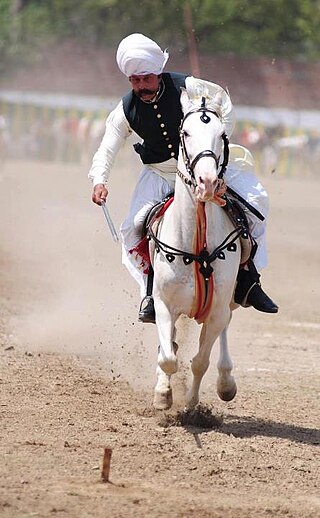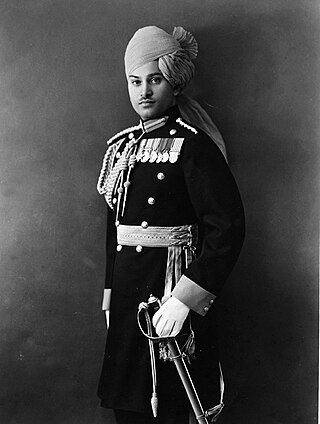
Polo or Chovgan is a ball game that is played on horseback, a traditional field sport and one of the world's oldest known team sports. It originated in ancient Persia, dating back over 2,000 years. Initially played by Persian nobility as a training exercise for cavalry units, polo eventually spread to other parts of the world. The game is played by two opposing teams with the objective of scoring using a long-handled wooden mallet to hit a small hard ball through the opposing team's goal. Each team has four mounted riders, and the game usually lasts one to two hours, divided into periods called chukkas or chukkers.

Mayo College is a boys-only private boarding school in Ajmer, Rajasthan, India. It was founded in 1875 by the 6th Earl of Mayo, who was the Viceroy of India from 1869 to 1872, making it one of the oldest public boarding schools in India.

Tent pegging is a cavalry sport of ancient origin, and is one of only ten equestrian disciplines officially recognised by the International Equestrian Federation. Used narrowly, the term refers to a specific mounted game with ground targets. More broadly, it refers to the entire class of mounted cavalry games involving pointed and edged weapons on horseback, for which the term "equestrian skill-at-arms" is also used.

The Federation of International Polo (FIP) is the international federation representing the sport of polo, officially recognized by the International Olympic Committee. The FIP was founded in 1982 by representatives of eleven national polo associations, and it represents the national polo associations of more than 80 countries. Its principal aim is to enhance the international image and status of polo.

Rao Raja Hanut Singh was a British Indian Army soldier and polo player.
Vishal Singh Rathore is a professional polo player from Rajasthan India, he is also known for his horse riding skills and polo pony training. He currently plays for Rajasthan Polo Club and has been the captain for the India national team 7 times.

The 8th Light Cavalry traces its origins from the 8th King George's Own Light Cavalry which was formed in 1922 by the amalgamation of the 26th King George's Own Light Cavalry and the 30th Lancers following a re-organisation of the Indian Cavalry Corps. Both regiments were regular cavalry units that had had long and distinguished records in the British Indian Army prior to their amalgamation. During World War II the regiment was converted into an armoured car unit and served during the Burma campaign. After India gained Independence the regiment was named 8th Light Cavalry.The regiment is the third oldest armoured regiment in India and is amongst the most highly decorated regiments in the country.

The 3rd Cavalry Regiment is a cavalry regiment of the Indian Army formed from the 5th and 8th Cavalry regiments in 1922.

The Deccan Horse or 9 Horse is one of the oldest and most decorated armoured regiments of the Indian Army. The Royal Deccan Horse , which was a regular cavalry regiment of the British Indian Army was formed from the amalgamation of two regiments after World War I. They saw service from the Mutiny of 1857 up to and including World War II.
Col. Maharaj Prem Singh (1915–2000) was an Indian polo player born in a polo-playing family on 15 November 1915. His grandfather, Maharaj Bhopal Singh was an excellent horseman while his grand uncle Sir Pratap Singh of Idar was a renowned polo player. Maharaj Prem received most of his training from his father, Maharaj Kishen Singh, who himself was an excellent player and had received training from the famous Major-General Delisle.

Calcutta Polo Club is a polo club located in Kolkata, West Bengal, India. It was established in 1862 and is considered to be the world's oldest operational polo club.

The 61st Cavalry Regiment is a horse-mounted cavalry regiment of the Indian Army. It is notable for being one of the largest, and also one of the last, operational non mechanised horse-mounted cavalry units in the world. Formerly deployed into active conflict, the 61st Cavalry is currently employed on ceremonial occasions, though it can be deployed for internal security or provide military aid to the civil power.
Major-General Claude Ernest Pert was a senior cavalry officer in the British Indian Army, and British India polo champion.
The Ezra Cup is a popular polo tournament conducted annually in India by the Calcutta Polo Club. It is claimed The Ezra Cup was first held in 1880. After a period of inactivity, it has now been revived by Keshav Bangur, Calcutta Polo Club's president.

The 15th Cavalry Brigade was a brigade-sized formation that served alongside British Empire forces in the Sinai and Palestine campaign, during World War I. Originally called the Imperial Service Cavalry Brigade it was formed from Imperial Service Troops provided by the Indian princely states of Jodhpur, Hyderabad, Mysore, and Patiala which each provided a regiment of lancers. A maximum of three regiments served in the brigade at any one time. The states of Kashmir, Idar and Kathiawar provided smaller detachments for the brigade, which was at times reinforced by other British Empire regiments and artillery batteries when on operations.

India is the birthplace of modern polo. The modern game of polo is derived from Manipur, where the game was known as sagol kangjei, kanjai-bazee, or pulu. It was the anglicised form of the last, referring to the wooden ball that was used, which was adopted by the sport in its slow spread to the west.
20th Lancers is an armoured regiment in the Armoured Corps of the Indian Army. The regiment distinguished itself in operations with its defence of Chhamb in Jammu and Kashmir during the 1965 Indo-Pakistan War and won one Maha Vir Chakra. It has provided one Chief of Army Staff and two Army Commanders.
The 6th Lancers is an armoured regiment of the Indian Army.
The Softball Association of India (SBAI) is the governing body for softball in India. Legally, it is a non-profit association registered under the Societies Registration Act, 1860.











